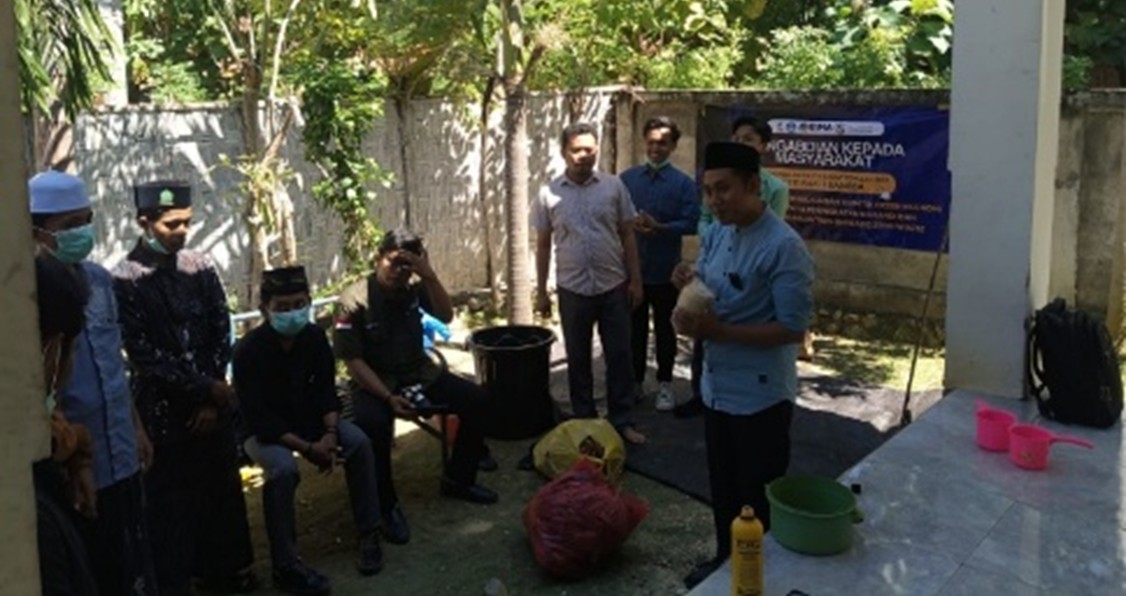Penerapan green economy dalam pembelajaran tematik untuk kemandirian ekonomi pesantren berbasis zero waste
DOI:
https://doi.org/10.53088/penamas.v5i3.2181Keywords:
Green Economy, Thematic Learning, Zero WasteAbstract
Islamic boarding schools (pesantren) play a strategic role in developing individuals who are morally upright and economically independent. However, many pesantren face environmental challenges due to poor waste management. This community service project aimed to implement the green economy concept based on zero waste through thematic learning as a means to enhance the economic independence of pesantren and create a cleaner, healthier environment. The project was conducted at the Sumber Anyar Pamekasan Islamic boarding school, located in the Fatahillah complex, utilizing the ADIED model (Analysis, Design, Implementation, Evaluation, and Development). Activities included socialization, educational training on waste management, hands-on workshops on converting waste into compost and crafts, and evaluation using pre-tests and post-tests. The results showed a significant improvement in participants' understanding, with an N-Gain score of 0.76 (high category). These findings demonstrate that integrating thematic learning with green economy principles is effective in raising environmental awareness while generating economic value. The program contributes to the development of a sustainable, environmentally conscious curriculum and empowers students in Islamic boarding schools.
References
Alfian, A., & Yaqin, M. N. (2024). Peran Pesantren dalam Menciptakan Kemandirian Belajar Santri. Fakta: Jurnal Pendidikan Agama Islam, 3(2), 59. https://doi.org/10.28944/fakta.v3i2.325
Anwar, M. (2022). Green Economy Sebagai Strategi Dalam Menangani Masalah Ekonomi Dan Multilateral. Jurnal Pajak Dan Keuangan Negara (PKN), 4(1S), 343–356. https://doi.org/10.31092/jpkn.v4i1s.1905
Fatmawati, E. (2021). Pembelajaran Tematik. Yayasan Penerbit Muhammad Zaini.
Fermansyah, I. J., Setyawati, Natje, M., Leonny, A., Verioga, D. M., & Prasetya, A. E. (2025). Pengembangan Media Pembelajaran Digital untuk Meningkatkan Pemahaman dan Kreativitas pada Peserta Didik Kelas II Sekolah Dasar dengan Model ADDIE. Khatulistiwa: Jurnal Pendidikan Dan Sosial Humaniora, 5(3), 191–205. https://doi.org/10.55606/khatulistiwa.v5i3.6722
Fitri, R., & Ondeng, S. (2022). Pesantren Di Indonesia: Lembaga Pembentukan Karakter. Al Urwatul Wutsqa: Kajian Pendidikan Islam, 2(1), 42–54.
Gustriani, T., & Kholis, M. (2024). Pembelajaran Life Skills bagi Santri sebagai Inovasi Pendidikan di Pesantren. Ainara Journal (Jurnal Penelitian Dan PKM Bidang Ilmu Pendidikan), 5(3), 290–296. https://doi.org/10.54371/ainj.v5i3.499
Hayati, M. (2022). Penerapan Model Pembelajaran Tematik tema Lingkungan Dengan Pendekatan Kontekstual Untuk Meningkatkan Hasil Belajar Siswa. Elementer, 1(1), 34–38.
Kolopita, C. P., Katili, M. R., & Yassin, R. M. T. (2022). Pengaruh Media Pembelajaran Terhadap Hasil Belajar Siswa Pada Mata Pelajaran Komputer dan Jaringan Dasar. Inverted: Journal of Information Technology Education, 2(1), 1–12. https://doi.org/10.37905/inverted.v2i1.13081
Kurniawan, A. B., & Hidayah, R. (2021). Kepraktisan Permainan Zuper Abase Berbasis Android Sebagai Media Pembelajaran Asam Basa. UNESA Journal of Chemical Education, 9(3), 317–323. https://doi.org/10.26740/ujced.v9n3.p317-323
Mubarok, D. (2023). Penerapan Green Economy Dalam Mencapai Pembangunan Ekonomi Berkelanjutan. Jurnal Bina Ummat: Membina Dan Membentengi Ummat, 6(2), 31–52. https://doi.org/10.38214/jurnalbinaummatstidnatsir.v6i2.195
Muhidin, N., Aminudin, A., & Rahmah, A. Q. N. (2025). Peranan Pondok Pesantren dalam Sistem Pendidikan Nasional. JIEP: Journal of Islamic Education Papua, 2(2), 82–94. https://doi.org/10.53491/jiep.v2i2.1248
Musoffan, Suprapto, H., & Nuraini, L. (2025). Peningkatan Produktifitas Wanita Pensisir Melalui Limbah Udang Sebagai Produk Lokal Dengan Konsep Blue Economy. Darmabakti: Jurnal Pengabdian Dan Pemberdayaan Masyarakat, 6(01), 30–37. https://doi.org/10.31102/darmabakti.2025.6.01.30-37
Musoffan, Sholeh, M. S., & Suprapto, H. (2023). Empowerment of Coastal Communities through Utilization of Fish Waste in Realizing a Blue Economy. Jurnal Abdimas, 27(2), 214–218. https://doi.org/10.15294/abdimas.v27i2.47985
Prabawati, M. A. (2022). Konsep green economy pada pola produksi dan konsumsi sebagai sustainable development goals (SDGs) berkualitas berbasis ekologi. Jurnal Sains Edukatika Indonesia (JSEI), 4(1), 36–42.
Pratama, S. F., Waid, S. H. I. A., & MSI, N. (2024). Green Economy Sebagai Strategi Dalam Meningkatkan Pertumbuhan Ekonomi Ditinjau Dari Perspektif Ekonomi Syariah. 4, 153–172.
Putera, D. B. R. A., Hartiningsih, T., & Abadiyah, S. S. (2023). Pengembangan produk green economy dalam bidang pendidikan untuk mendukung sdgs. Jurnal Natural Science Educational Research, 6(2), 171–179. https://doi.org/10.21107/nser.v6i1.27144
Qamariyah, S., & Abdullah, I. (2022). Pemberdayaan Santri Dan Masyarakat Melalui Kegiatan Ekonomi Kreatif Daur Ulang Sampah Di Pondok Pesantren An-Nasyiin Desa Grujugan Kecamtan Larangan. Revenue : Jurnal Ekonomi Pembangunan Dan Ekonomi Islam, 5(01), 30–36. https://doi.org/10.56998/jr.v5i01.46
Sadali, S. (2020). Eksisntensi Pesantren Sebagai Lembaga Pendidikan Islam. Atta’dib Jurnal Pendidikan Agama Islam, 1(2), 13. https://doi.org/10.30863/attadib.v1i2.964
Siregar, S. H. (2020). Mudarabah dalam Perspektif Hukum Ekonomi Syariah dan Implikasinya terhadap Lembaga Keuangan Syariah. Ijtihad, 36(1), 18–28.
Suryosubroto. (2009). Proses Belajar Mengajar di Sekolah. Rineka Cipta.

Downloads
Published
How to Cite
Issue
Section
License
Copyright (c) 2025 Siti Qamariyah, Musoffan Musoffan, Muhammad Shoimus Sholeh

This work is licensed under a Creative Commons Attribution-ShareAlike 4.0 International License.
Authors who publish with this journal agree to the following terms:
The author(s) retain copyright and grant the journal the right of first publication with the work simultaneously licensed under a CC BY-SA 4.0 license that allows others to remix, adapt, and build upon the work even for commercial purposes, as long as they credit the author(s) and license their new creations under the identical terms.
License details: https://creativecommons.org/licenses/by-sa/4.0/


